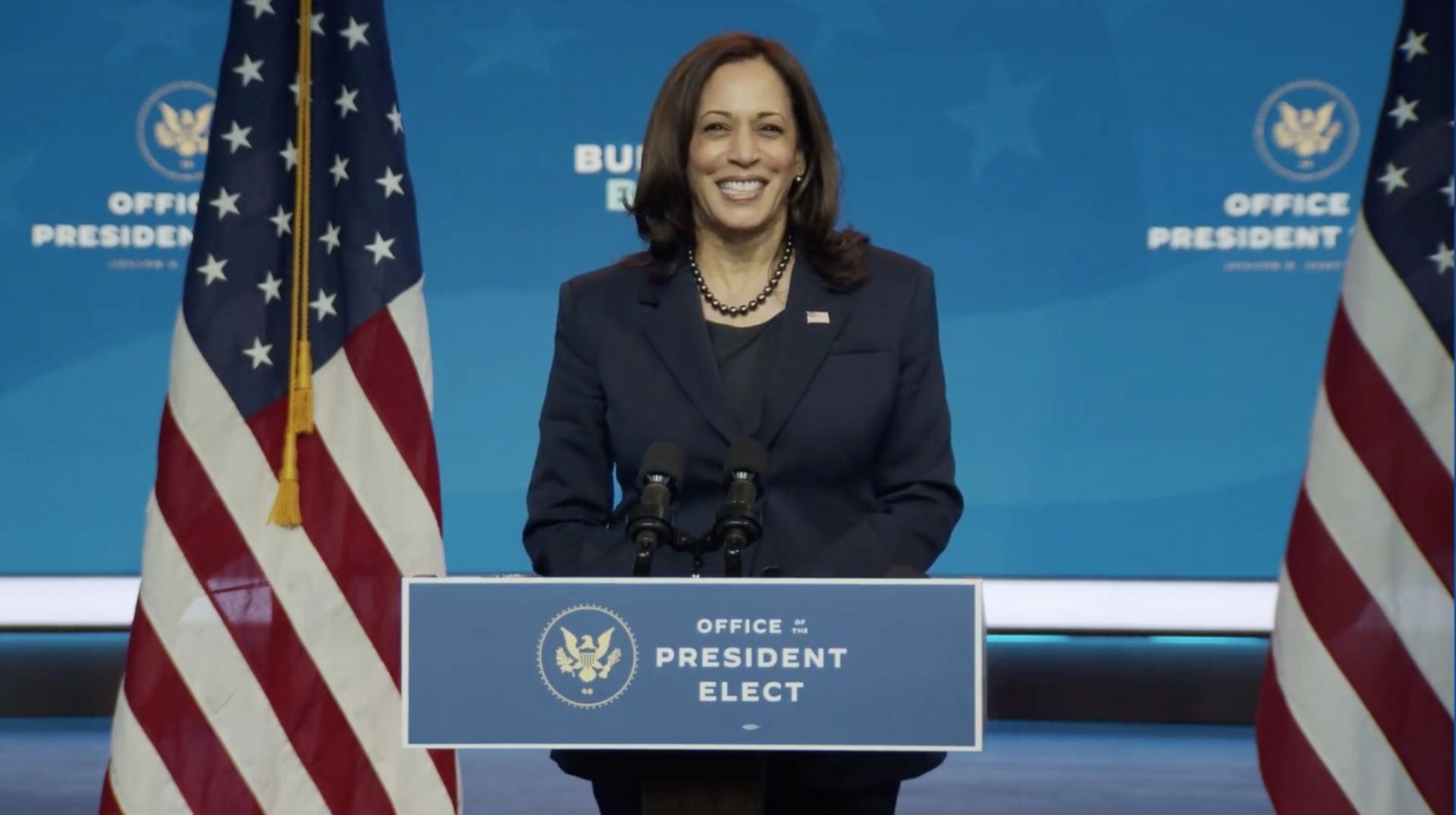
United States Vice President-elect Kamala Harris delivers remarks on the “economic recovery and building back better” in Wilmington, Delaware on Monday, November 16, 2020. Credit: Sipa USA via TNS
When Alexa Askari heard the news of President-elect Joe Biden’s and Vice President-elect Kamala Harris’ election win, she said she burst into tears.
“I’ve always wanted to run for office. That’s always been my dream, and I truly had felt ‘If [Democrats] lose this election, I don’t know if I’m gonna ever have that opportunity,’” Askari, a second-year law student at Ohio State’s Moritz College of Law, said.
Harris is the first woman, first South Asian American and first Black vice president-elect of the United States. For women of color in particular, Harris’ nomination symbolizes much more than a vice presidential win but an open door for their future.
As a Middle Eastern, Muslim, Jewish woman, Askari stressed the importance of having representation in positions of power.
“That’s what politics is, it’s visibility,” Askari said. “That’s why it’s so important to continue this work, to get more people that look like America into political office.”
Harris is no stranger to breaking glass ceilings as the first South Asian American and second Black woman to be elected as a California senator. She was also the first Black woman appointed as California’s attorney general, according to her senate website.
Ramona Stephenson, a third-year in psychology, said in her home country of Jamaica, it is not rare for women of color to hold positions of power and “to see that transfer here, it reminds [her] of home.”
Jamaica is also home to Harris’ father, who emigrated from the island to receive his doctorate degree at the University of California, Berkeley in the 1960s. Her mother also emigrated from India to pursue higher education at the university where the two met. They divorced in 1972, according to the New York Times.
Since moving to the U.S. five years ago, Stephenson said she felt like she is in the U.S. but still outside of it at the same time.
“To just see that somebody who is a daughter of immigrants making it that far, it just gives you a sense that it doesn’t matter what anyone tells you — ‘You don’t belong here’ or ‘You’re not from here, you can’t achieve what people who are from here can achieve’ — so it just breaks those barriers down,” Stephenson said.
Shayla Kendricks, a second-year law student at Moritz, said given Biden’s status as the oldest president in U.S. history, Harris is closer to the presidency than any woman has ever been. She said this defies the narrative that women are not fit for the highest office.
“She brings so many different aspects of what some would consider the American dream to a population that has historically not had access to it,” Kendricks said. “And so I think that it’s the access that makes her so compelling and that brings hope to so many people.”
Kendricks said, however, that she is concerned Harris will face more public scrutiny than previous vice presidents.
“As a Black woman, she’s going to experience critique and political outcry and social outcry in a manner that no one else would,” Kendricks said.
However, Askari said although she remains hopeful for Biden and Harris’ term, she will still hold Harris accountable as she would any other politician.
“This is a massive, massive accomplishment, but I also fear sort of like the fetishization of Harris’ — of her Blackness, of her brownness, of her just being a woman,” Askari said. “I hope that it doesn’t preclude us from taking her to task for her past record.”
Harris’ record as attorney general was criticized repeatedly on the trail during her own unsuccessful bid for president. In an interview with Angela Rye, Harris admitted to being a part of the criminal justice system when mass incarceration exploded in California during the ’80s and ’90s, which overwhelmingly impacted Black and Latino citizens.
Nonetheless, Askari and Kendricks both said her rise to the White House creates necessary visibility for people from underrepresented backgrounds.
“I think that one of the most important parts about having her in the White House is just that visibility and that continuous visibility, like she’s not going anywhere,” Askari said. “We’re going to be seeing her, we’re going to be seeing her make decisions on behalf of all of us, no matter what color, what gender we are.”


